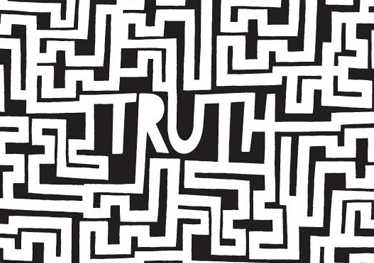Is truth real? What truth do we know, and how do we know it? Humankind has been asking these questions for a very long time and, big surprise, we’re no closer than ever on agreeing on answers.
If anything, our scientific age inclines us not towards confidence in what we know, but awareness of how much we don’t. The entire scientific enterprise is predicated on assuming that what we know will be replaced with greater knowledge in the future. Thus, the scientific answer to the questions of truth is that all truth is provisional and that which we consider truth today will appear as falsehood tomorrow.
Religion has dogmatically attempted to proclaim the truth, but it too has faced problems. Religious dogma varies religion to religion, presenting a difficulty of genocidal proportion. The proclamation of religious truth provides a stable framework for those who are adherents within a religious tradition, but yields an unstable framework between religions. Even within single religions, disagreements arise which divide the faith; the conflict between Catholic and Protestant Christians fueled lengthy conflicts resulting in the deaths of millions.
Non-theistic religions like Buddhism or Taoism have promoted “the dogma of no dogma.” Such an approach has the benefit of not having to prove the truth of anything; “The Tao that can be named is not the true Tao”, for example, provides plenty of wiggle room, while Zen Koans create semantic paradoxes pointing to our essential inability to proclaim absolute truth. Yet, the dogma of no dogma is also self-negating, leaving us back where the question began.
Political systems proclaim dogmatic truth, resulting in episodes of lethal of conflicts. Capitalism versus Fascism versus Communism fueled a 20th century military-industrial arms race–still fully-funded–devoted to nuclear weapons capable of wiping out all life on planet earth. “Better Dead Than Red” was a popular expression while I was growing up. Dogma doesn’t get much more dogmatic than that.
Greek philosophers such as Plato grappled with the question in a metaphoric discourse about mistaking the nature of shadows cast upon the wall of a cave and accepting falsehood for truth. Post modern philosophy embraces a relativistic criteria, placing truth within the framework of contextual perspective. Your truth, post modernists declare, is as valid as my truth, and attempts to prove otherwise require rigidly imposing a power-differentiated frame-of-reference of inherent bias. Yikes.
Psychology, a hybrid of science and religion, attempts to address the question of truth as well. Freudians describe a vast and powerful subconscious realm and the projection of that inner world upon the outer. Jungians adhere to the central role of the collective unconscious, another shadowy repository from which human interactions are drawn. Behaviorists view truth locked behind a veil of well-conditioned and habitual responses. Occult practices, astrology, Tarot and the like are all ways in which we seek truth; long before any of these, the Aztecs conducted massive human sacrifice to satisfy the truth of their dogma about the regeneration of human life.
Seeking truth is about wondering “why?” Mathematics seems exceptionally capable of answering the question “how” but has not yet provided the answer to “why.” Study of the universe has not yet yielded a complete operating manual or explanation. For now, the only workable answer to the question of “why?”–and which gratefully requires no elaboration–is “because.”
